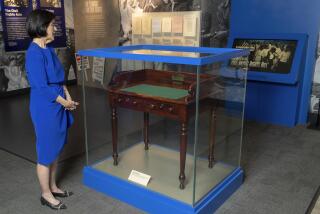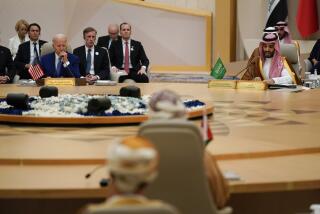Clinton’s reform or else message
- Share via
During the George W. Bush administration, the goal of promoting democracy in the Middle East was so intertwined with the invasion and occupation of Iraq that it became discredited in some quarters. That may explain why President Obama’s advocacy of democracy in the region has been more subdued than that of his predecessor.
That may be changing. In a speech this week in Qatar, Secretary of State Hillary Rodham Clinton warned Middle Eastern leaders, many of them autocrats, that “in too many places, in too many ways, the region’s foundations are sinking into the sand.”
She added: “Those who cling to the status quo may be able to hold back the full impact of their countries’ problems for a little while, but not forever. If leaders don’t offer a positive vision and give young people meaningful ways to contribute, others will fill the vacuum. Extremist elements, terrorist groups and others who would prey on desperation and poverty are already out there, appealing for allegiance and competing for influence. So this is a critical moment, and this is a test of leadership for all of us.”
Clinton addressed economics as well as politics. Citing the large number of unemployed young people in Middle Eastern societies, she noted that “people have grown tired of corrupt institutions and a stagnant political order.” As if to vindicate Clinton’s wisdom, Tunisia’s President Zine el Abidine ben Ali stepped down Friday after widespread rioting engendered by corruption in the government and high unemployment.
Clinton’s advice was apt and astringent, but it’s doubtful many regimes will take it — and it’s uncertain how hard the U.S. will press for it. In the past, pragmatic geopolitical calculations have played more of a role in determining whom the U.S. allies itself with than a desire to democratize the region.
What’s more, even with the object lesson of Tunisia, Clinton’s preachments are likely to be resisted, including by some of the United States’ “friends” in the region, including Egyptian President Hosni Mubarak, who has been in office for nearly 30 years, and the royal family of Saudi Arabia.
Mubarak epitomizes the problem. For years, the United States has given him billions of dollars in aid in return for his country’s recognition of Israel. But Mubarak also presides over — in Clinton’s terms — a “stagnant political order.”
Still, the United States should by all means press Egypt, Saudi Arabia and other states in the region to accept Clinton’s analysis, which has the advantage of couching the case for reform in terms of current leaders’ self-interest. A more democratic, more open and less corrupt Middle East is also in the interest of the United States.
More to Read
Sign up for Essential California
The most important California stories and recommendations in your inbox every morning.
You may occasionally receive promotional content from the Los Angeles Times.










